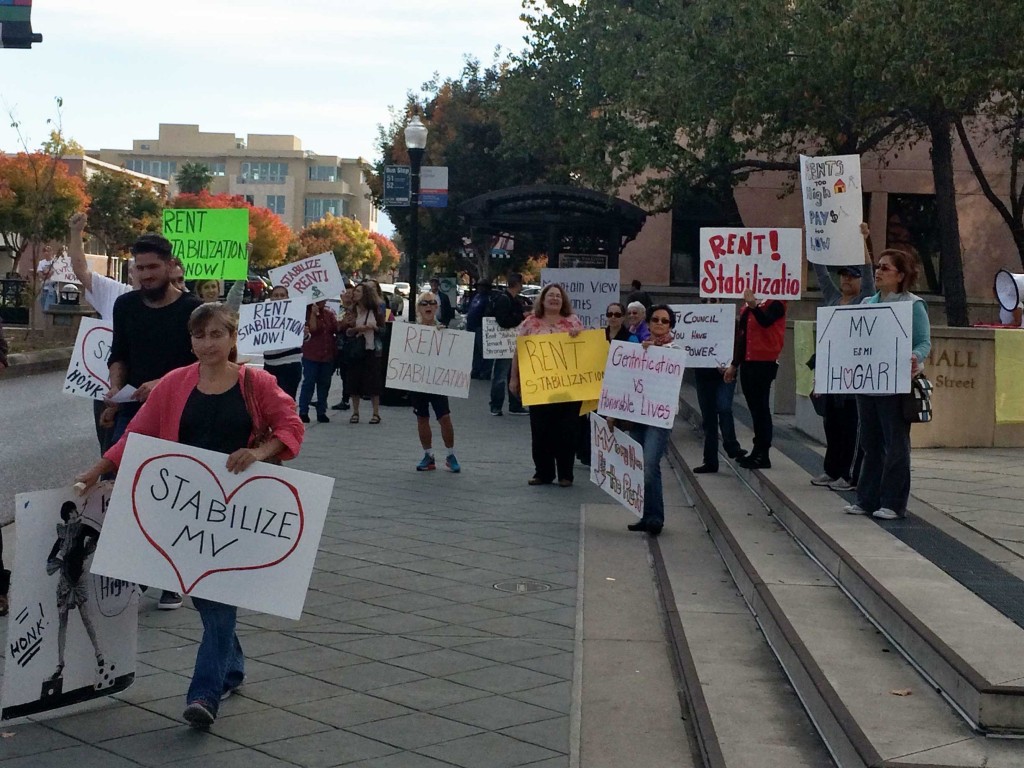The Mountain View City Council will consider on Dec. 1 whether to expand rent subsidies for low-income households and whether to adopt a measure that would make it harder for landlords to increase rents.
The discussion comes after hundreds of residents took part in protests and turned out at council meetings throughout September and October to demand relief for tenants who report they increasingly face eviction or need to relocate amid sudden, sharp rent increases.
Rents in Mountain View rose 7.9 percent in the last year, compared to a national increase of 3.7 percent, according to real estate website Zillow. The monthly median rent in Mountain View is $4,211.

The city council is considering several policy options to assist renters, and the Mountain View Tenants Coalition aims for another big turnout at the Dec. 1 meeting. “Our one hope for action soon is this December 1 meeting,” tenants’ coalition member Edie Keating said.
Vice Mayor Pat Showalter expects an expanded subsidy program to pass but said she could not predict the extent of the expansion or when it would go into effect because state law prohibits private discussions among a majority of council members on matters before the council.
In a report it prepared for the Dec. 1 meeting, city staff have outlined possible programs for the council to discuss and recommended appropriating $150,000 to pilot an enhanced rental assistance program with Community Services Agency, which already runs a limited subsidy program with $36,000 in funding.
Three options are to be considered, ranging from scaling up the existing program to adding more comprehensive services, in line with best practices. The proposed programs would extend assistance to 27 to 40 additional households. Full implementation of these programs would range from $215,000 to $420,000, including the recommended $150,000 for a pilot phase.
The city council will also consider a potential mandatory mediation program, which would give tenants the right to compel landlords to attend mediation when rent increases by a certain amount.
Mediation is optional in Mountain View today, but city staff detailed six local mandatory mediation programs — in Palo Alto, Los Gatos, Campbell, Fremont, San Leandro and Alameda — in its report for the Dec. 1 meeting.
City Attorney Jannie Quinn focused on the program in Los Gatos during a meeting she held with tenants advocates on Nov. 19, according to Mountain View Tenants Coalition members Joan MacDonald and María Marroquín, who attended the meeting.
Considered a form of “soft rental control,” the Los Gatos program permits tenants to request mediation for annual rent hikes that exceed 5 percent, or 70 percent of the rate of inflation, with the option of binding arbitration if mediation fails to produce a settlement.
Martin Eichner, who was responsible by contract for the Los Gatos program as director of Dispute Resolution Programs for Project Sentinel from 2001 to 2013, said that the town does not require landlords to report rental rates. Rather, tenants must file a complaint with the mediation program to contest rent increases.
At a League of Women Voters meeting about housing issues in Mountain View on Nov. 20, Eichner added, “The city might never learn about excessive rent increases,” Eichner said.
Marroquín pointed out that the Los Gatos program does not provide adequate protection against unjust evictions but said, “It’s better than nothing.”
The Mountain View City Council will also revisit a proposed ordinance that would make it harder for landlords to evict tenants. This “right-to-lease” ordinance would require landlords to offer six-month or one-year leases and would only allow tenants to ask for month-to-month arrangements.
Landlords have more opportunities to evict tenants with month-to-month leases than with longer-term leases because protections against evictions without cause last only for the term of the lease. At the end of the lease term, a landlord may evict a tenant for any reason, as long as he provides 30 to 60 days notice.
The proposed lease requirement would bar landlords from charging higher rents for longer-term leases although landlord advocates argue that landlords usually charge more per month for month-to-month leases, which give both landlord and tenant less certainty.
Depending on what the council decides on Dec. 1, the lease requirement could take effect as soon as Jan. 7.
